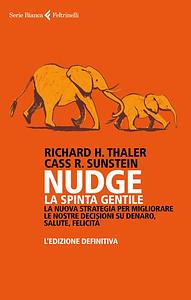Take a photo of a barcode or cover
Very United states centric with regards to finances (many chapters) and health care. Choice architecture was an interesting discussion. Now to apply it to my four-year-old.
Really good book if you are interested in political psychology, slightly outdated socially but many of their points still stand and the whole concept of nudges needs to more readily used these days where the world and the choices we face have gotten so much more complex.
Mixed feelings about the book, the first one third of the book was good .... the other part was exhausting.....
Really disappointing in this book for as much hype as it had. I have a different world view than most so I did not think anything was Earth shattering. Especially the chapters that when on and on about retirement income. Maybe I read too much Kiyosaki and maybe I am way to interested real estate, stocks, and entrepreneurship. I just found the content to be blah. Yes this would help a lot of people better themselves but, it leaves a lot of people like me shrugging.
Pick and choose your sections, some of it was very interesting and had good information. Other parts bored me to tears and skipped a few of the chapters.
I really enjoyed the book, but I do feel Thaler and Sunstein wasted a few chapters on non-nudge issues such as marriage equality and the financial crisis of 2008. But all in all a really good read and an insight into the mix field of psychology and economy.
A good book, although too focused on America to really hit home. However, I do not blame the authors - it's just that so many things are so different from there to here.
Anyway, I applaud the whole Nudge-principle and commend the libertarian paternalism they advocate, which in many instances could bring the left and the right together to actually achieve something. We have enough issues to get started on: all sorts of health matters, from drinking, smoking, overeating, to eating food from sustainable sources. And today we were discussing what to do to make people take their rubbish to the bin/the dump instead of leaving it along the roads and in the streets. And there's the organ donor matters, which also here in Denmark is a huge problem, where one person a week dies, because of our policy in this area.
I hope to see some really cool nudges implemented by the Danish authorities real soon!
Anyway, I applaud the whole Nudge-principle and commend the libertarian paternalism they advocate, which in many instances could bring the left and the right together to actually achieve something. We have enough issues to get started on: all sorts of health matters, from drinking, smoking, overeating, to eating food from sustainable sources. And today we were discussing what to do to make people take their rubbish to the bin/the dump instead of leaving it along the roads and in the streets. And there's the organ donor matters, which also here in Denmark is a huge problem, where one person a week dies, because of our policy in this area.
I hope to see some really cool nudges implemented by the Danish authorities real soon!
I liked it whenever they mentioned the difference between how people would behave if they were all "econs" and how they tend to behave because people are all "humans".
Valuable content on the role of paternalistic nudges to ensure safety and provide guidance to society whilst maintaining freedom of liberty.
The book made interesting points but dragged them out, and then repeated them, managing to fill over 200 pages.
It was hardly groundbreaking and could have been written as a long essay or (it’s final) chapter at most
The book made interesting points but dragged them out, and then repeated them, managing to fill over 200 pages.
It was hardly groundbreaking and could have been written as a long essay or (it’s final) chapter at most





